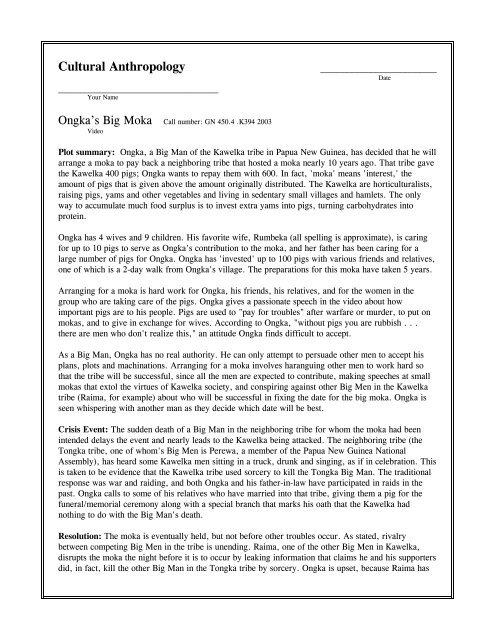viewing guide
viewing guide
viewing guide
Create successful ePaper yourself
Turn your PDF publications into a flip-book with our unique Google optimized e-Paper software.
Cultural Anthropology<br />
_________________________________<br />
Your Name<br />
________________________<br />
Date<br />
Ongka’s Big Moka Call number: GN 450.4 .K394 2003<br />
Video<br />
Plot summary: Ongka, a Big Man of the Kawelka tribe in Papua New Guinea, has decided that he will<br />
arrange a moka to pay back a neighboring tribe that hosted a moka nearly 10 years ago. That tribe gave<br />
the Kawelka 400 pigs; Ongka wants to repay them with 600. In fact, 'moka' means 'interest,' the<br />
amount of pigs that is given above the amount originally distributed. The Kawelka are horticulturalists,<br />
raising pigs, yams and other vegetables and living in sedentary small villages and hamlets. The only<br />
way to accumulate much food surplus is to invest extra yams into pigs, turning carbohydrates into<br />
protein.<br />
Ongka has 4 wives and 9 children. His favorite wife, Rumbeka (all spelling is approximate), is caring<br />
for up to 10 pigs to serve as Ongka's contribution to the moka, and her father has been caring for a<br />
large number of pigs for Ongka. Ongka has 'invested' up to 100 pigs with various friends and relatives,<br />
one of which is a 2-day walk from Ongka's village. The preparations for this moka have taken 5 years.<br />
Arranging for a moka is hard work for Ongka, his friends, his relatives, and for the women in the<br />
group who are taking care of the pigs. Ongka gives a passionate speech in the video about how<br />
important pigs are to his people. Pigs are used to "pay for troubles" after warfare or murder, to put on<br />
mokas, and to give in exchange for wives. According to Ongka, "without pigs you are rubbish . . .<br />
there are men who don't realize this," an attitude Ongka finds difficult to accept.<br />
As a Big Man, Ongka has no real authority. He can only attempt to persuade other men to accept his<br />
plans, plots and machinations. Arranging for a moka involves haranguing other men to work hard so<br />
that the tribe will be successful, since all the men are expected to contribute, making speeches at small<br />
mokas that extol the virtues of Kawelka society, and conspiring against other Big Men in the Kawelka<br />
tribe (Raima, for example) about who will be successful in fixing the date for the big moka. Ongka is<br />
seen whispering with another man as they decide which date will be best.<br />
Crisis Event: The sudden death of a Big Man in the neighboring tribe for whom the moka had been<br />
intended delays the event and nearly leads to the Kawelka being attacked. The neighboring tribe (the<br />
Tongka tribe, one of whom's Big Men is Perewa, a member of the Papua New Guinea National<br />
Assembly), has heard some Kawelka men sitting in a truck, drunk and singing, as if in celebration. This<br />
is taken to be evidence that the Kawelka tribe used sorcery to kill the Tongka Big Man. The traditional<br />
response was war and raiding, and both Ongka and his father-in-law have participated in raids in the<br />
past. Ongka calls to some of his relatives who have married into that tribe, giving them a pig for the<br />
funeral/memorial ceremony along with a special branch that marks his oath that the Kawelka had<br />
nothing to do with the Big Man's death.<br />
Resolution: The moka is eventually held, but not before other troubles occur. As stated, rivalry<br />
between competing Big Men in the tribe is unending. Raima, one of the other Big Men in Kawelka,<br />
disrupts the moka the night before it is to occur by leaking information that claims he and his supporters<br />
did, in fact, kill the other Big Man in the Tongka tribe by sorcery. Ongka is upset, because Raima has
no business bringing the topic up at such a late date, and because the information causes a huge<br />
commotion among the people. The following day, the day the moka was to be held, the members of the<br />
Kawelka tribe who have married into the Tongka tribe begin a raid on Raima in revenge for his alleged<br />
sorcery. Ongka stops them by sitting in the middle of the road. They stop their attack momentarily to<br />
listen to his advice, and some of them drop out of the war party while others continue. Raima is not<br />
killed, but a few days later four of his pigs are killed. Perewa, who had been waiting at home all<br />
summer for the moka, takes the truck that had been bought to be distributed to his tribe at the moka and<br />
leaves, returning to Port Moresby to consider matters of national independence.<br />
The moka is held finally. In it, 600 pigs, $10,000 Australian dollars, 12 cassowaries, 8 cows and a<br />
motorbike are given. The truck has been brought back, washed and decorated with flowers and is<br />
'given' again in the moka. In his speech at the moka, Ongka says, "Now that I have given you these<br />
things, I have won . . . I have knocked you down by giving so much."<br />
Things to consider:<br />
1. What motivates someone like Ongka to work so hard?<br />
2. What functions does a moka serve?<br />
3. Are there any similar institutions in the USA? How would they be different?<br />
What struck me most . . .

















